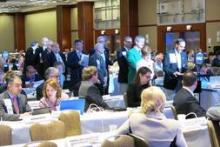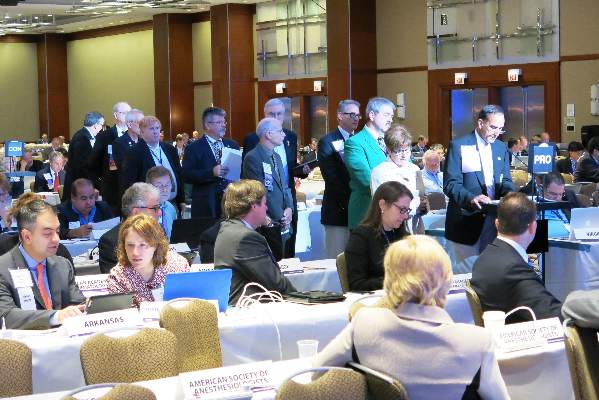User login
CHICAGO – With the ICD-10 transition looming, delegates to the annual meeting of the American Medical Association House of Delegates want their organization to advocate for giving some room to physicians to adjust.
A resolution submitted by the Alabama delegation calls on the AMA to push for a 2-year grace period during which physicians would not be penalized for errors, mistakes, and other system malfunctions, and payments would not be withheld due to coding errors.
Dr. W. Jeff Terry, chairman of the Alabama delegation, noted that, despite the AMA’s policies and efforts against ICD-10, the government stands firm on its Oct. 1 implementation date.
“I truly believe that we have just not educated Congress well enough as to the issues of the consequences of ICD-10,” Dr. Terry said.
“We – as our AMA, me, and all of you – just haven’t done our job well enough. … I want to stress here today what our AMA message should be from out of this meeting. Even though the American Medical Association is firm in its view that the switch to ICD-10 is a mistake, we also recognized that there are other groups that are fighting to maintain the Oct. 1 implementation date. In order to maintain patients’ access to care and protect physicians’ practices, we offer a compromise solution that will allow ICD-10 to be implemented as planned on Oct. 1, and at same time, protect physicians from suffering financial consequences as a result of coding errors and mistakes for a 2-year period,” he said.
He called for the AMA to put in motion a letter-writing campaign to advocate for the grace period. “This should be our number-one priority, at least from now until Oct. 1, when it won’t matter.”
Dr. Wanda Filer, delegate from the American Academy of Family Physicians, echoed Dr. Terry.
“At this point, we believe that the adoption of ICD-10 is inevitable and, recognizing that advocacy resources are finite, we would like to encourage our AMA to work with CMS to prepare for this and ensure a soft landing for all physicians and patients … rather than a hard start,” said Dr. Filer, who is also AAFP president-elect.
Delegates suggested that the organization focus on how ICD-10 requirements could affect small practices and their patients. They called on the AMA to track data on rejected claims, payment delays resulting from coding errors, and the impact on patient volume.
Reference Committee B, which addresses matters of federal legislation, considered a number of other issues, almost without dissent. One exception was a resolution advocating for background checks on all gun sales, which met with some resistance as being onerous for certain people in specific situations.
Resolutions will be voted on by the full House of Delegates June 8-10.
CHICAGO – With the ICD-10 transition looming, delegates to the annual meeting of the American Medical Association House of Delegates want their organization to advocate for giving some room to physicians to adjust.
A resolution submitted by the Alabama delegation calls on the AMA to push for a 2-year grace period during which physicians would not be penalized for errors, mistakes, and other system malfunctions, and payments would not be withheld due to coding errors.
Dr. W. Jeff Terry, chairman of the Alabama delegation, noted that, despite the AMA’s policies and efforts against ICD-10, the government stands firm on its Oct. 1 implementation date.
“I truly believe that we have just not educated Congress well enough as to the issues of the consequences of ICD-10,” Dr. Terry said.
“We – as our AMA, me, and all of you – just haven’t done our job well enough. … I want to stress here today what our AMA message should be from out of this meeting. Even though the American Medical Association is firm in its view that the switch to ICD-10 is a mistake, we also recognized that there are other groups that are fighting to maintain the Oct. 1 implementation date. In order to maintain patients’ access to care and protect physicians’ practices, we offer a compromise solution that will allow ICD-10 to be implemented as planned on Oct. 1, and at same time, protect physicians from suffering financial consequences as a result of coding errors and mistakes for a 2-year period,” he said.
He called for the AMA to put in motion a letter-writing campaign to advocate for the grace period. “This should be our number-one priority, at least from now until Oct. 1, when it won’t matter.”
Dr. Wanda Filer, delegate from the American Academy of Family Physicians, echoed Dr. Terry.
“At this point, we believe that the adoption of ICD-10 is inevitable and, recognizing that advocacy resources are finite, we would like to encourage our AMA to work with CMS to prepare for this and ensure a soft landing for all physicians and patients … rather than a hard start,” said Dr. Filer, who is also AAFP president-elect.
Delegates suggested that the organization focus on how ICD-10 requirements could affect small practices and their patients. They called on the AMA to track data on rejected claims, payment delays resulting from coding errors, and the impact on patient volume.
Reference Committee B, which addresses matters of federal legislation, considered a number of other issues, almost without dissent. One exception was a resolution advocating for background checks on all gun sales, which met with some resistance as being onerous for certain people in specific situations.
Resolutions will be voted on by the full House of Delegates June 8-10.
CHICAGO – With the ICD-10 transition looming, delegates to the annual meeting of the American Medical Association House of Delegates want their organization to advocate for giving some room to physicians to adjust.
A resolution submitted by the Alabama delegation calls on the AMA to push for a 2-year grace period during which physicians would not be penalized for errors, mistakes, and other system malfunctions, and payments would not be withheld due to coding errors.
Dr. W. Jeff Terry, chairman of the Alabama delegation, noted that, despite the AMA’s policies and efforts against ICD-10, the government stands firm on its Oct. 1 implementation date.
“I truly believe that we have just not educated Congress well enough as to the issues of the consequences of ICD-10,” Dr. Terry said.
“We – as our AMA, me, and all of you – just haven’t done our job well enough. … I want to stress here today what our AMA message should be from out of this meeting. Even though the American Medical Association is firm in its view that the switch to ICD-10 is a mistake, we also recognized that there are other groups that are fighting to maintain the Oct. 1 implementation date. In order to maintain patients’ access to care and protect physicians’ practices, we offer a compromise solution that will allow ICD-10 to be implemented as planned on Oct. 1, and at same time, protect physicians from suffering financial consequences as a result of coding errors and mistakes for a 2-year period,” he said.
He called for the AMA to put in motion a letter-writing campaign to advocate for the grace period. “This should be our number-one priority, at least from now until Oct. 1, when it won’t matter.”
Dr. Wanda Filer, delegate from the American Academy of Family Physicians, echoed Dr. Terry.
“At this point, we believe that the adoption of ICD-10 is inevitable and, recognizing that advocacy resources are finite, we would like to encourage our AMA to work with CMS to prepare for this and ensure a soft landing for all physicians and patients … rather than a hard start,” said Dr. Filer, who is also AAFP president-elect.
Delegates suggested that the organization focus on how ICD-10 requirements could affect small practices and their patients. They called on the AMA to track data on rejected claims, payment delays resulting from coding errors, and the impact on patient volume.
Reference Committee B, which addresses matters of federal legislation, considered a number of other issues, almost without dissent. One exception was a resolution advocating for background checks on all gun sales, which met with some resistance as being onerous for certain people in specific situations.
Resolutions will be voted on by the full House of Delegates June 8-10.
AT THE AMA HOD MEETING

